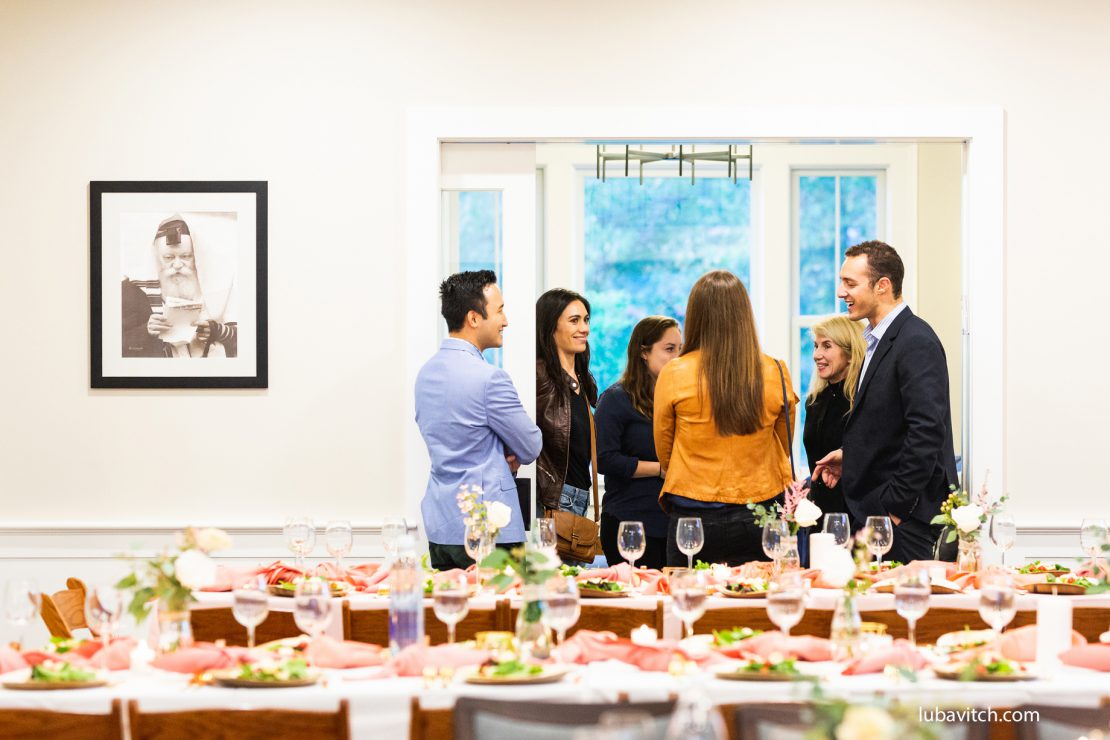After an uplifting Shabbat service, I faced an awkward moment: balancing a plate of food, a drink, and a healthy helping of self-consciousness, I looked for a table to join for the Kiddush. We had recently moved from cold Connecticut to sunny Florida and everything was new to us: grocery stores, restaurants, gyms, and synagogues.
This thriving Chabad House was a great discovery. The young, dynamic rabbi had just given a brilliant and humorous sermon. He and his wife exuded warmth. They had built a large and lively congregation. Now I had to find my place in it. I had come alone and knew no one. The spacious banquet hall housing the Kiddush was jammed with round tables that were filling up fast.
Which one should I join?
The question brought back a long dormant middle-school memory: after having been assigned lunch seats the previous seven school years, we were free to sit where and with whom we wished. Watching people take their seats on this Saturday, I recalled the adolescent anxiety I had felt searching for a spot in the school cafeteria, and learning that things as trivial as the length of my bell-bottom pants (reaching top of the sock, bad; top of the sneaker, good) might lead to rejection.
When I finally joined a table, no one cared about my clothes. But, after the usual pleasantries, I did encounter scrutiny of another sort: several of my tablemates wanted to know if I identified with red or blue America. This wasn’t merely making conversation. Without anyone saying it, I gathered that where one stood determined where one should sit.
At another time in my life, I would have been eager to engage my questioners. I grew up in a family that relished political debate. As a young boy at our family seders I could have been forgiven for thinking that the Jews had escaped Vietnam, not Egypt, given how often the meal-time conversation returned to that vexed war. I still participate in my share of partisan disputes, but I have come to believe that they are out of place at a Kiddush luncheon.
Why? Why abstain from politics during this time?
The rabbis teach that Shabbat offers “a taste of the world to come.” This poetic description invites us to step outside of ordinary time and space, put aside the pedestrian activities of the work week, and enter a transcendent place—one of peace, pleasure, kindness, and good will. The rules restricting the use of phones, laptops, and TV’s make it easier to take the step toward the “world to come.” While I cannot say what that world is like, I am confident it does not feature endless clashes between cable networks fighting for control of a “narrative.”
Closeness with friends and family is a crucial part of the Shabbat experience. Political disagreements rarely strengthen, and often fray, those ties. And if a “big narrative” is needed to enliven the conversation, what could be better than the parsha of the week? As we move through the Book of Shemot, we again study our origins as a people. God wrenched us free from Egypt’s iron grip and guided us to the land that was, and is once again despite all odds, the home of the Jewish people. Shemot’s cinematographic account of our leaving Egypt is a dramatic reminder that the covenant that unites us to each other and to God is eternal, while the heated issues of the day are fleeting and soon forgotten.
And so when the question of political identity came up that morning I bobbed and weaved, avoiding politics by acting, ironically, like a politician. But one of my interlocutors was having none of it. He needed an answer. It was then that I received, like the Hebrews at the shore of the Reed Sea, an unexpected deliverance. When the conversation segued briefly to the location of our new Florida home, I described it as being close to the one landmark I knew, a locally famous supermarket called Grain to Plate. Grain to Plate’s flamboyant owner plasters posters of his politics on the windows and doors of his store, and those politics were, Baruch Hashem, the same as my interlocutor’s. I had mentioned the store only as a geographical reference point, but he had taken it as a performance of his fraternity’s secret handshake. We moved on to other topics.
I have since learned to be careful about mentioning that store by name, especially among my fellow Jews. Some of them react vehemently to it, virtually swearing that their right arm should lose its cunning if they ever shop there. Others, like my table mate, see it as a beacon of American values attached to a great produce section. To me, it is just a nearby supermarket, but one whose name often triggers a stern lecture or high five.
There are many places to sit at this impressive Chabad House, and through trial and error I have been finding the tables where I am most comfortable. While that first, awkward search for the right place transported me back to middle school, there is a big difference between that memory and this moment. Following the Rebbe’s credo, each Chabad House welcomes every Jew with love. That means that somewhere in Saturday’s animated crowd, amid the laughter and chatter and, yes, the politics, there is a seat for me. And if I don’t find it this Shabbat, then surely I will on the next.
The writer welcomes comments from readers, and invites you to comment below or email him at alex.troy@honestscholar.com
Alex Troy worked at two Jewish schools, teaching history at one and serving as head of the other. He has written a novel inspired by his time as an educator, which will be published in 2023. Alex also worked as a lawyer and investor. He and his wife, Dale, have three grown daughters. They live in Florida and Connecticut.

Be the first to write a comment.